Memoirs & Diaries - The Zeebrugge Affair
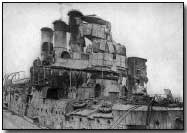 Let me, first of all, try
to tell you the story of Zeebrugge as I extracted it, not without
difficulty, from several of the leading spirits of that enterprise.
Let me, first of all, try
to tell you the story of Zeebrugge as I extracted it, not without
difficulty, from several of the leading spirits of that enterprise.
This is no technical story. Elsewhere you will find the official narrative issued by the Admiralty to the Press, and that contains, as all good official documents do, names, ranks, dates, times, and movements.
I lay claim to no such precision. It is my proud yet humble task to bring you face to face, if I can, with the men who went out to greet what they regarded as certain death - bear that in mind - in order to stop, in some measure, the German submarine menace, and to prove yet once again to all the world that the British Navy is the same in spirit as it was in the days of Nelson and far down the ages.
These men went out on the eve of St. George's Day, 1918, to do those two things - the one utilitarian, the other romantic. They went out to block the Bruges Canal at Zeebrugge - to stop that mouth which for so long past has been vomiting forth its submarines and its destroyers against our hospital ships, and our merchant vessels, and the merchant vessels of countries not engaged in this war.
 They
blocked it so neatly, so effectively, that it will be utterly useless as a
submarine base for - I long to tell you the opinion of the experts, but I
may not - many months to come.
They
blocked it so neatly, so effectively, that it will be utterly useless as a
submarine base for - I long to tell you the opinion of the experts, but I
may not - many months to come.
This shall be proved for you as we proceed. Now let me explain, very briefly, the nature of the task which the Navy set itself. You imagine Zeebrugge, perhaps, as a long and dreary breakwater, flanked by flat and sparsely populated country, with a few German coastguards dotted about, and a destroyer or two in the offing.
I am certain that that is the mental picture most of us had of Zeebrugge - if we had one at all.
Now conceive instead a crowded fortress. Conceive a garrison of no less than one thousand men ever on the break-water. Figure to yourself, at every possible coign of vantage, guns of mighty calibre, destroyers lurking beneath the Mole on the harbour side, searchlights at all points, and great land guns in the distance ready to pulverize any hostile craft that dares to show its nose within miles.
Picture all that as vividly as you can, and then ask yourself the question: "Would it be possible to storm Zeebrugge so successfully that block-ships could be sunk in the very mouth of the Canal and seal it up?"
How would you have set about it? With a huge force of cruisers? No, for the enemy must be taken by surprise. The action must be swift, cunning, and sure. The enemy must not be warned, or your one object, the blocking of the Canal, will be lost.
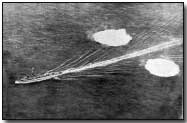 It
took Lord Jellicoe and Sir Roger Keyes six long and anxious months to
perfect their plan, with the chance that the secret, at any moment, might
slip out.
It
took Lord Jellicoe and Sir Roger Keyes six long and anxious months to
perfect their plan, with the chance that the secret, at any moment, might
slip out.
But it was perfect at last, and the secret had not slipped out. Next they wanted a number of men - picked men with special qualities - who would be ready and eager to die if only this amazing coup might be achieved.
Last of all they wanted a night on which all the conditions - the wind, the weather, the light - should be in their favour. They did not get that, but they went in, none the less, and did the job.
What would you say if you heard, some fine morning, that an almost obsolete German cruiser had come and leant up against the wall of Dover Harbor, that two German officers had calmly sat astride the wall in the course of their business, that some German sailors had landed on the wall and chased our gunners away from their guns, and that, in the meantime, three quite obsolete German ships, filled with concrete, had been sunk in the mouth of the harbour and blocked it? What in the world would you say?
I think you would at first refuse to believe it. Then, when some official communication lent colour to the story, you would tear your hair, declare that all was lost, and utter extremely unpleasant things about the British Forces and those in charge of them.
Yet this is precisely what happened at Zeebrugge. There is nothing more gallant in the annals of the British Navy. Not one man expected to come back. There is nothing more successful in the annals of the British Navy. They did to the full just what they hoped and had planned to do.
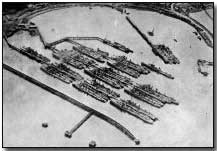 "Some
people," said Captain Carpenter, "have called this affair audacious.
That isn't the word I should use for it."
"Some
people," said Captain Carpenter, "have called this affair audacious.
That isn't the word I should use for it."
"What word would you use?"
"Impertinent," he replied, laughingly. "Just imagine this Armada of smoke-boats, motor launches, ferry-boats, obsolete submarines, and ancient cruisers laden with concrete, headed by the old Vindictive, setting out in broad day-light to attack the mighty fortress of Zeebrugge."
"In broad daylight!" I exclaimed.
"Certainly. We timed ourselves to reach the Mole by midnight, so, owing to our slow speed, we had to do three hours of the oversea passage in daylight."
"How were the men? Excited?"
"Oh, no; quite calm, and immensely relieved to be at it at last. Well, so soon as it got dark, it was dark! We could hardly see a thing, and when the smoke-boats got to work, pouring out great waves of dense smoke at regular intervals, which the light northeast wind carried right across the Mole and the harbour, pitch doesn't describe it!"
"What about the mine-field?"
"H'm! Anyway, we dodged it. My job, you understand, was to get alongside the Mole, land my Marines, help Iris and Daffodil to do the same, stay there drawing the fire of the batteries and diverting attention while the block-ships got into the Canal and sunk themselves, then get the Marines back on board, shove off, and clear out as quickly as possible.
"Incidentally, of course, we meant to put out of action as many Huns as was convenient by fire from our guns. You've seen the picture of the fighting-top? That was filled with Marines armed with Lewis guns. They did capital work. I'll come to that later.
"We got pretty near the Mole before they saw us, and then the fun began! Up went the star-shells, the guns began blazing, and we went pell-mell for the old Mole like that."
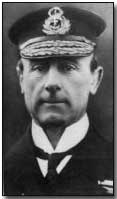 A
savage dig at the model with his cane.
A
savage dig at the model with his cane.
"I had intended to fetch up just here" - he indicated a spot on the exterior of the great wall pretty near the head of it - "but actually came in here" - a little further inland.
"We'd had things called 'brows' constructed - a sort of light drawbridge with a hinge in the middle. These were lowered away, but the current was so strong against the Mole, and the Vindictive bounced up and down so nimbly, that the men had the devil of a job to drop the ends of these brows on the wall.
"All this time, naturally enough, the Huns were blazing at us with everything they'd got. If you have a look at the Vindictive in the morning, you'll soon see what they were doing to us. We were just swept with fire from two sides. Even before the party could begin to land, Colonel Elliot and Captain Halahan, poor chaps, who were in charge of that part of the business, were killed.
"The Iris went ahead of me and came alongside the Mole just here" - a little nearer the shore end. "They tried to hang on with their grapnels, but couldn't quite manage it, so Lieut.-Commander Bradford and Lieut. Hawkins scrambled ashore and sat on the parapet, trying to fix the grapnels. They were both killed.
"In the meantime, owing to the difficulty of securing to the Mole when alongside, I ordered the Daffodil to continue pushing, according to plan, so as to keep us in position. This was a pity, because she was full of men, and they couldn't land to help with the fighting. Eventually, some of them scrambled across the Vindictive and landed that way.
"The wind had changed about fifteen minutes before we came alongside the Mole; all the smoke had cleared off and the harbour was plain to the eye. That helped the Huns to pot at us, and they took fine advantage of it. The din, as you can guess, was terrific, and I think they got the old Vindictive in every visible spot.
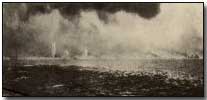 "Suddenly
the thing happened for which we had been, semi-consciously, waiting.
There was a tremendous roar, and up went a huge tower of flame and debris
and bodies into the black sky! My fellows cheered like mad, for they
knew what it meant. Sandford had got home beneath the viaduct with his
ancient submarine and touched her off. I never saw such a column of
flame! It seemed a mile high!
"Suddenly
the thing happened for which we had been, semi-consciously, waiting.
There was a tremendous roar, and up went a huge tower of flame and debris
and bodies into the black sky! My fellows cheered like mad, for they
knew what it meant. Sandford had got home beneath the viaduct with his
ancient submarine and touched her off. I never saw such a column of
flame! It seemed a mile high!
"I must tell you a curious feature of this affair. As he approached the Mole they got the searchlights on to him and began firing at him. That was a nasty position, because she was stuffed full of explosives, and also had a big quantity of petrol on board. But when they saw him still coming on, and dashing straight at the Mole, they stopped firing and simply gaped. I suppose they thought he was mad.
"Anyway, they paid for their curiosity. On the viaduct itself there were a whole lot of Huns - masses of them. There they stood, staring at Sandford in his submarine. The searchlights lit them up. Then, presently, came the explosion, and bang went the whole lot to glory! They must have been the most surprised Huns since the war started.
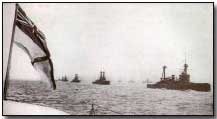 "All
this time, of course, a lot of other things were happening. Many of
the seamen and Marines had landed on the Mole and were making fine play with
the astonished Germans. Some went right to the head of the Mole and
found the guns deserted. One gun, I must tell you, had not even been
uncovered, which is clear proof that the garrison was taken by surprise.
Others were chasing the enemy all down the Mole towards the viaduct, which
they were never to cross, and some went into the shed I told you about and
dealt with such people as they found.
"All
this time, of course, a lot of other things were happening. Many of
the seamen and Marines had landed on the Mole and were making fine play with
the astonished Germans. Some went right to the head of the Mole and
found the guns deserted. One gun, I must tell you, had not even been
uncovered, which is clear proof that the garrison was taken by surprise.
Others were chasing the enemy all down the Mole towards the viaduct, which
they were never to cross, and some went into the shed I told you about and
dealt with such people as they found.
"The men in the fighting-top were also doing fell work. All along the Mole, you see, and close under the fifteen-foot parapet, there are dug-outs or funk-holes. At first the Huns popped into these, but by-and-by it occurred to them that they would certainly be found and spitted if they stayed there, so the bright idea occurred to them of nipping across the Mole and dropping down the side into their own destroyers lying there. An excellent scheme but for our fellows in the fighting-top, who picked them off with their Lewis guns as they ran.
"Those chaps in the fighting-top had to pay for it, though, in the end. They were attracting a lot of attention, and the Huns were constantly trying to drop a shell amongst them. They succeeded at last, I'm sorry to say, and laid out every man jack but one - Sergeant Finch. He was wounded badly, but dragged himself out from under the bodies of his pals and went on working his little gun until he couldn't work it any longer.
"Now we come to the block-ships. We saw Thetis come steaming into the harbour in grand style. She made straight for the opening to the Canal, and you can imagine that she was a blaze of light and a target for every big thing they could bring to bear. She was going toppingly, all the same, when she had the rotten luck to catch her propeller in the defence-nets. Even then, however, she did fine work. She signalled instructions to the Intrepid and Iphigenia, and so they managed to avoid the nets. It was a gorgeous piece of cooperation!
"And, by the way, I'm not at all sure that Thetis won't give even more trouble to the enemy than the other two. I told you something, I think, about the tendency of the harbour to silt up. Well, Thetis is lying plump in the channel that must always be kept clear of silt. The consequence is that the silt will collect all round her and over her, and I doubt whether she will ever be removable.
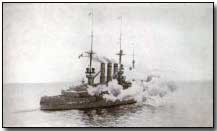 "To
get back to the other block-ships. In went Intrepid, and in
after her went Iphigenia. They weren't content, you know, to
sink themselves at the mouth of the Canal. That was not the idea at
all. They had to go right in, with guns firing point-blank at them
from both banks, sink their ships, and get back as best they could.
And they did it.
"To
get back to the other block-ships. In went Intrepid, and in
after her went Iphigenia. They weren't content, you know, to
sink themselves at the mouth of the Canal. That was not the idea at
all. They had to go right in, with guns firing point-blank at them
from both banks, sink their ships, and get back as best they could.
And they did it.
"They blocked that Canal as neatly and effectively as we could have wished in our most optimistic moments, and then, thanks to the little motor-launches, which were handled with the finest skill and pluck, the commanders and men got back to safety. Tomorrow I'll show you some aeroplane photographs which are due in from France, and you'll see for yourself how beautifully Intrepid and Iphigenia are lying.
"As soon as we saw that the block-ships were sunk we knew that our job was done. Now came the most ticklish part of the business - to get away. Up to this point we had been protected, so far as our hull was concerned, by the Mole. We knew that, directly we left the Mole, we should be in for it.
"The signal arranged for the men to re-embark was a long blast from Vindictive's siren. But that had gone with a lot of other tackle, so we did the best we could with Daffodil's little hooter. (Ferry passengers across the Mersey must know it well.) It wasn't much of a hoot, but the fellows heard it, and made for the scaling-ladders.
"This was the Hun's chance. The fire turned on those chaps as they clambered up the ladders, most of them trying to carry a dead or wounded pal, was awful. Talk about heroism! Every man was a hero! You must ask some of them who actually landed to tell you about that. Wonderful!
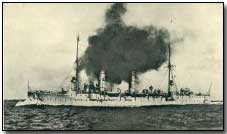 "We
got them aboard at last, and stayed to make certain that nobody was left
behind. Then we shoved off from the Mole, which had had enough of us
for one night, and made for home at our best speed. Instantly the big
shore-guns and everything else vicious blazed away, but the very wind which
had turned against us when we arrived now stood our friend.
"We
got them aboard at last, and stayed to make certain that nobody was left
behind. Then we shoved off from the Mole, which had had enough of us
for one night, and made for home at our best speed. Instantly the big
shore-guns and everything else vicious blazed away, but the very wind which
had turned against us when we arrived now stood our friend.
"We worked all our smoke-boxes like mad, and the smoke saved us. They landed some shells home, of course, and a lot of poor fellows in the Iris were killed by one shell just as they were leaving the Mole. But most of the stuff aimed at the Vindictive fell short, thank God, and we finally ran out of range.
"It was a good fight. I think the Huns saw their ending that night."
Source: Source Records of the Great War, Vol. VI, ed. Charles F. Horne, National Alumni 1923
Photographs courtesy of Photos of the Great War website.
"Bully Beef" comprised cans of boiled or pickled beef used by the British Army.
- Did you know?
